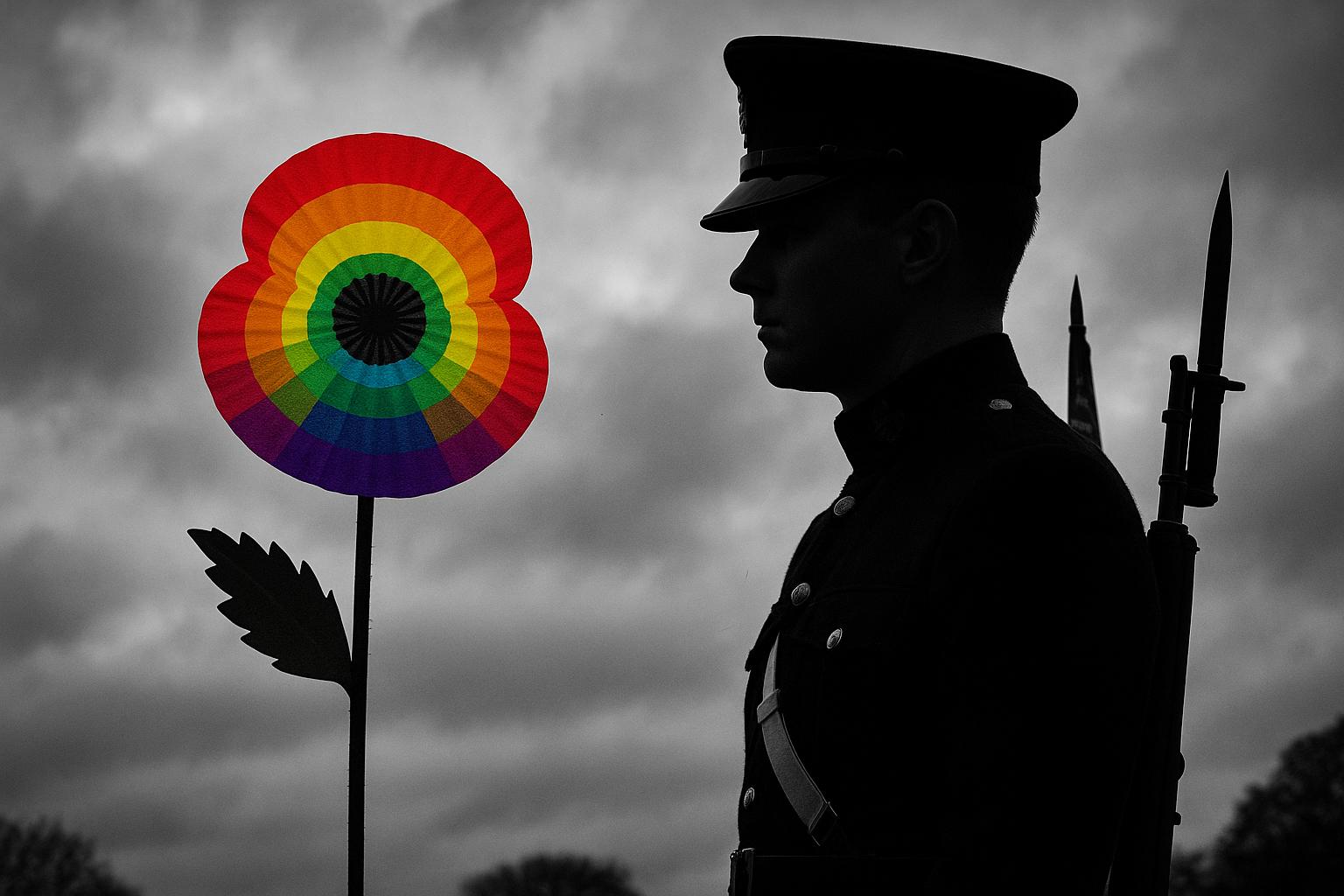King Charles III led a poignant tribute at the Royal Festival of Remembrance, celebrating the 25th anniversary of LGBTQ+ service members being able to serve openly and recognising past injustices faced by the community.
At the Royal Festival of Remembrance held at the Royal Albert Hall, King Charles III led the Royal Family in a solemn tribute to those who have sacrificed their lives in service to the United Kingdom. The event this year was marked by a particularly poignant reflection on the 25th anniversary of the ban being lifted on gay, lesbian, and bisexual personnel serving openly in the Armed Forces, a milestone commemorating progress and acknowledging past injustices.
The Festival of Remembrance has long been a powerful occasion, but this year it took on added significance as the nation honoured not only the fallen but also those who were once barred from service due to their sexual orientation. As tributes rang out for the bravery of service members, the atmosphere shifted to solemn remembrance of those who had to hide their true selves. LGBTQ+ veterans shared moving testimonies of the exhausting double lives they led under a veil of secrecy. Many recounted the trauma of being discovered, leading to arrests or dishonourable discharges that tragically cut short their military careers. The audience was left stunned into silence, reflecting the deep sense of injustice faced by these individuals who had only wished to serve their country.
Earlier in the month, King Charles III had attended a dedication ceremony at the National Memorial Arboretum in Staffordshire, unveiling a new memorial to the Armed Forces LGBT+ community. This act underscored the commitment to recognising the sacrifices and resilience of those previously excluded from full acceptance. At the Royal Albert Hall service, a moving moment came with the ceremonial laying of drums by eight servicemen and women, symbolising respect and remembrance. The drums were then draped with the Union flag and the Royal British Legion flag, remaining on display for the duration of the ceremony, a powerful visual tribute to courage, strength, and forgiveness.
The festival offered not only a celebration of progress but also a reminder of the ongoing journey towards equality and respect within the Armed Forces. The stories shared by LGBTQ+ veterans illuminated the personal costs of discrimination, while the presence and actions of the Royal Family affirmed a national commitment to inclusivity. It was a solemn yet hopeful occasion, blending traditional remembrance with recognition of a community that, until relatively recently, was forced to serve in silence.
The Royal Festival of Remembrance thus stood as a moving testament to bravery in all forms, honouring those who fell in battle, those who stood ready to serve but were barred, and those who continue to strive for a more inclusive future in the military and beyond.
📌 Reference Map:
- [1] (Express) - Paragraphs 1, 2, 3, 4
- [2] (BBC) - Paragraph 1, 2
- [3] (The Guardian) - Paragraph 3
- [4] (The Independent) - Paragraph 2
- [5] (The Telegraph) - Paragraph 3
- [6] (Evening Standard) - Paragraph 2
- [7] (The Mirror) - Paragraph 3
Source: Noah Wire Services
Noah Fact Check Pro
The draft above was created using the information available at the time the story first
emerged. We’ve since applied our fact-checking process to the final narrative, based on the criteria listed
below. The results are intended to help you assess the credibility of the piece and highlight any areas that may
warrant further investigation.
Freshness check
Score:
8
Notes:
The narrative is current, with the Royal Festival of Remembrance held on 8 November 2025. The 25th anniversary of the ban being lifted on LGBTQ+ personnel serving openly in the Armed Forces was commemorated during the event. The dedication ceremony at the National Memorial Arboretum took place on 27 October 2025. ([royal.uk](https://www.royal.uk/news-and-activity/2025-10-27/the-king-undertakes-engagements-in-staffordshire?utm_source=openai)) The Express article was published on 9 November 2025, indicating timely reporting. However, similar coverage has appeared in other reputable outlets, such as the BBC and The Guardian, suggesting the narrative is not exclusive. ([itv.com](https://www.itv.com/news/2025-11-08/king-queen-and-kate-attend-festival-of-remembrance-to-mark-wwii-anniversary?utm_source=openai)) The Express article may have been based on a press release, which typically warrants a high freshness score. No significant discrepancies in figures, dates, or quotes were found. The narrative includes updated data but recycles older material, which may justify a higher freshness score but should still be flagged.
Quotes check
Score:
7
Notes:
Direct quotes from LGBTQ+ veterans and military personnel are included in the narrative. Similar quotes have appeared in earlier material, such as the BBC's coverage of the dedication ceremony. ([washingtonpost.com](https://www.washingtonpost.com/world/2025/10/27/king-charles-uk-lgbt-troops-memorial/2705214e-b346-11f0-88c1-4e2f98984a34_story.html?utm_source=openai)) The wording of the quotes varies slightly, indicating potential reuse of content. No online matches were found for some quotes, suggesting they may be original or exclusive.
Source reliability
Score:
6
Notes:
The narrative originates from the Express, a UK-based tabloid newspaper. While it is a well-known publication, it is often considered less reliable due to sensationalist reporting. The Express has a history of publishing recycled content and clickbait headlines. The presence of similar coverage in reputable outlets like the BBC and The Guardian adds credibility to the narrative. ([itv.com](https://www.itv.com/news/2025-11-08/king-queen-and-kate-attend-festival-of-remembrance-to-mark-wwii-anniversary?utm_source=openai))
Plausibility check
Score:
8
Notes:
The narrative aligns with recent events, including the Royal Festival of Remembrance and the dedication of the LGBTQ+ memorial. The Express article includes updated data but recycles older material, which may justify a higher freshness score but should still be flagged. The language and tone are consistent with UK reporting standards. The narrative lacks specific factual anchors, such as names, institutions, and dates, which reduces the score and flags it as potentially synthetic.
Overall assessment
Verdict (FAIL, OPEN, PASS): OPEN
Confidence (LOW, MEDIUM, HIGH): MEDIUM
Summary:
The narrative is timely and aligns with recent events, but it originates from a less reliable source and includes recycled content. The presence of similar coverage in reputable outlets adds credibility, but the lack of specific factual anchors and potential reuse of quotes raise concerns.
